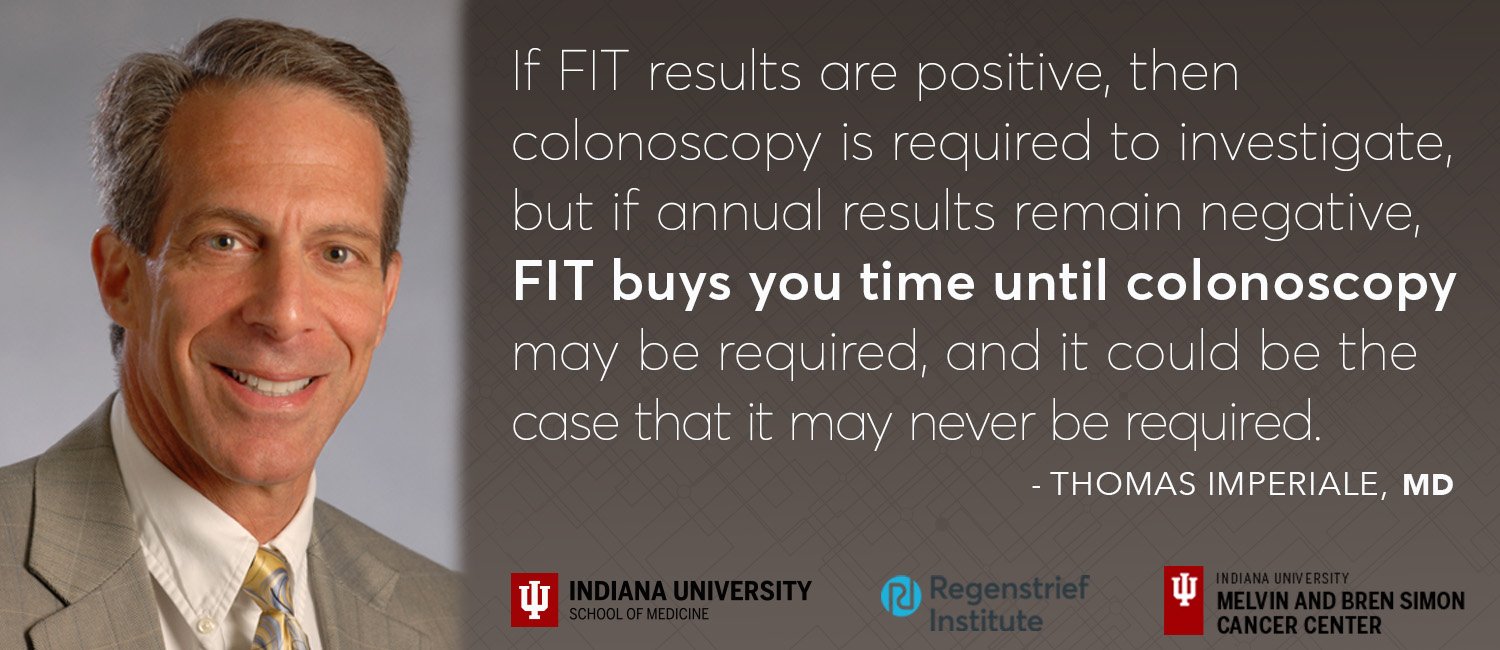A new study by Regenstrief Institute and Indiana University School of Medicine provides the strongest evidence to date to support recommendations that average risk patients can safely opt for an annual, easy-to-use home stool test instead of a screening colonoscopy.
The researchers reviewed and analyzed the findings of 31 studies with a total of 120,255 participants. Each individual had a FIT (short for fecal immunochemical test), which identifies hidden blood in stool. FIT results were compared to the finding of a subsequent screening colonoscopy and were found to have high detection rates for colorectal cancer.
The study results are published online in advance of print in the March 6, 2019 issue of Annals of Internal
Medicine.
“Our analysis finds that FIT is a good ‘pre-screening’ test for average risk, asymptomatic adults, saving
them hassle and the U.S. healthcare system costs,” said Thomas Imperiale, MD, the lead author, a gastroenterologist with IU School of Medicine and a research scientist with the Regenstrief Institute. “If
annual FIT results remain negative, FIT buys you time until colonoscopy may be required, and it could be the case that a colonoscopy for screening may never be necessary or required.”
Colonoscopy is considered to be the gold standard in the United States for colon cancer screening, and it is often performed in average-risk, asymptomatic adults 50 and older. But, in other countries, such as the United Kingdom, Canada, and Italy, colonoscopy is typically performed for average risk individuals with no symptoms only if FIT results are positive.
Imperiale said the research indicates a similar approach could be safely deployed in the United States and elsewhere, but only if there is a system to ensure annual testing.
“We need a system that is population-based rather than the current opportunistic one – with better laboratory-physician coordination, dedicated follow-up, and assurance that colonoscopy is performed if FIT results are positive,” he said. “The power of FIT is in its repeat application and in many cases, repeatedly negative results.”
Of the more than 4,000 English-language studies on FIT that Imperiale and Rachel Gruber, a Regenstrief Institute research coordinator, reviewed, only the 31 studies that were analyzed included both FIT and colonoscopy results for each study participant. Approximately a third of the participants with positive FIT results in these 31 studies were found to have an advanced precancerous polyp or actual colon cancer. The U.S. Preventive Services Task Force currently recommends screening for colorectal cancer using fecal occult blood testing — the category that includes FIT — sigmoidoscopy, colonoscopy, and other tests from age 50 to age 75, without preferentially recommending one particular screening test.
Dr. Imperiale is the Lawrence Lumeng Professor in Gastroenterology and Hepatology at IU School of Medicine, a health services research scientist with Regenstrief Institute and a member of the Indiana University Melvin and Bren Simon Cancer Center.
Other co-authors of “Test Characteristics of Fecal Immunochemical Tests for Colorectal Cancer and Advanced Adenomatous Polyps: A Systematic Review and Meta-analysis” are Timothy E. Stump, MA, Patrick O. Monahan, PhD, and Thomas Emmett, MD, all of IU School of Medicine. The work was supported by IU School of Medicine, Regenstrief Institute and IU Simon Cancer Center.









